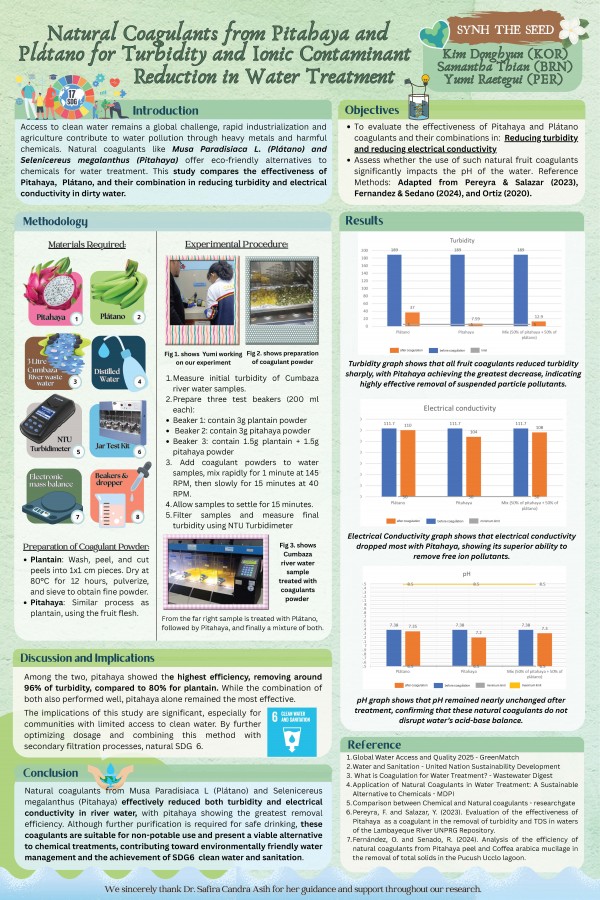|
SynhtheSeed_poster Sep 17, 2025 Administrator Hit 29 |
|
Team : Synh the Seed Member : Yumi Reátegui (PER), Thian Siao Fen (BRN), Kim DongHyun (ROK) Mentor : Dr. Safira Candra Asih Research Title : Natural Coagulants from Pitahaya and Plátano for Turbidity and Ionic Contaminant Reduction in Water Treatment Research summary : Clean water remains a difficult resource to acquire, becoming a global challenge. Rapid industrialisation and intensive agricultural practices have increased the contamination of water sources with heavy metals and harmful chemicals that affect the stability of our ecosystems and the health of everyone who consumes them. With this problem, natural coagulants such as Musa paradisiaca L. (plantain) and Selenicereus megalanthus (pitahaya) appear as ecological alternatives to conventional chemicals used in water treatment. The present study aims to evaluate the effectiveness of pitahaya, plantain and the combination of both in reducing the turbidity and electrical conductivity of the Cumbaza river water, as well as to analyse whether these substances significantly modify the pH of the treated water, in order to evaluate the possibility of any risk for their use. The methodology consisted of preparing coagulant powders from fruit peels: they were washed, cut, dried at 80 °C for 12 hours, pulverised and sieved to obtain a fine powder. These coagulants were then applied to water samples in a jar test. Three treatments were prepared: one with 3 g of banana powder, one with 3 g of pitahaya and one with 1.5 g of each fruit. After mixing and allowing the samples to stand, turbidity, electrical conductivity and pH were measured. The results revealed that all treatments progressively reduced turbidity, with pitahaya being the most effective with a 96% reduction, compared to 80% achieved by plantain. The combination of the two also showed good results, but without outperforming pitahaya alone. Similarly, electrical conductivity decreased more significantly with pitahaya. As for pH, it remained practically stable, indicating that these coagulants do not alter the acid-base balance of the water. The implications of this study are promising, especially for communities lacking access to advanced purification technologies. Although supplementary treatment is required to reach potable levels, the use of natural coagulants represents a viable option for non-potable uses and promotes the achievement of Sustainable Development Goal 6 (clean water and sanitation). Natural coagulants derived from pitahaya and plantain were effective in removing suspended particles and pollutant ions from river water, with pitahaya standing out for its high efficiency. This environmentally friendly and accessible solution can be incorporated into sustainable water management strategies. However, further tests with the fruit should be carried out to establish the absolute truth and the precise dosage to ensure effective cleaning of the water to be treated. |
- Previous Climate Shrimp_Poster 25.08.01
- Next Octonauts_poster 25.08.01
There are no registered comments.




